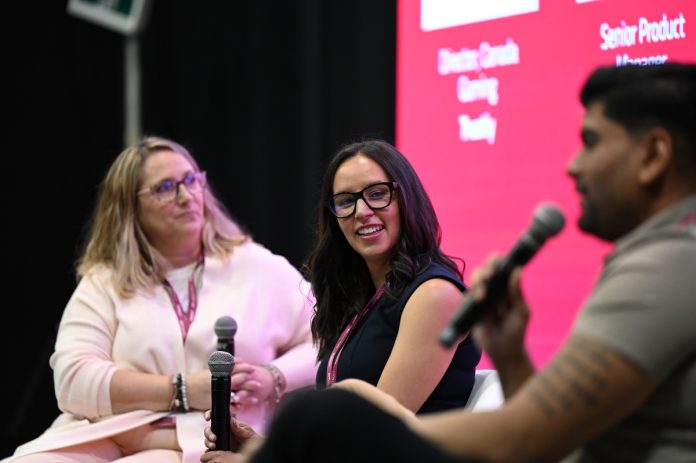When speaking about the growth of the sports betting sector, we often focus upon the digital space – whether that be online betting, mobile apps, or even digital advertising. However, retail has the potential to really “redefine” the sports betting industry over the next few days, according to SUZOHAPP’s Tiffany Sadler.
In her role as Head of Marketing and Product, Sadler helps determine how SUZOHAPP “guides the industry with new innovative products” and also aids in educating partners on how retail products can be used to evolve the industry.
She explained that retail offers an opportunity for conversion that the online space may not – and at a time of high player acquisition costs, this is an opportunity that perhaps more sportsbooks should be considering.
Sadler said: “The online gambling industry, while certainly good at acquiring some of these new customers, is fairly involved and a bit invasive. The likelihood of customer acquisition on the online side of things is pretty low, especially when it comes to bettors that have never wagered before. It requires a lot of upfront information from the end user just to place the bet.
“Retail, however, is an opportunity to convert your run-of-the-mill sports fan into a sports bettor. So someone that doesn’t really know much about sports betting, but is a huge fan, can take advantage of a retail location by placing a bet on a sport they might know about without the rigmarole of signing up for an online account.”
The retail sports betting setting, Sadler continued, offers a social dynamic that the online space has not yet achieved.
Sports bettors are able to bet using the cash from their pockets, or even by using a voucher from the sportsbook bar and cage cashier. Without that “rigmarole” of signing up for an account, bettors are also able to gain a much more “immediate response and reaction” to a bet placed, Sadler added.
She commented: “If they’re in a retail setting that allows for sports betting, they can take cash in their pockets or even just get a voucher from the bar or from a cashier at the cage. They can then place that bet with no sign up or delay. It’s an immediate response and reaction.
“I think that being a sports fan is inherently social. The foundation of this activity is in person and usually at a sports bar, maybe an arena or a stadium, and the sports betting industry can – and really must – take advantage of that element of sports fans in order to progress further and really grow the market and ensure profitability.”
Talk soon turned towards in-play betting and the role that retail can play in driving the adoption of live betting markets. For the Head of Marketing and Product, the take-up of in-play markets in the US has been somewhat slower than Europe – with around 70% of bets in Europe being in-play compared to 30% in the US.
According to Sadler, the retail space has a “tremendous opportunity” to capitalise on in-play betting.This, however, requires the right kind of hardware,
Sadler said: “I would say the majority of sports bettors currently within the American sports betting market are more in that professional side, they’re not those ‘green’ sports fans that have just been converted to sports bettors. So there is a lot of potential to transition.
“In our opinion, retail will actually help push that transition to in-play. If you support your land-based offering with the right kind of hardware – for example, a bar top where you can continue placing bets at the bar while watching the game – it just expedites the process.
“To that same end,there’s a lot of work that needs to be done in simplifying our platforms to make them more conducive to in-play betting. I think that’s the next step for us.
“As a global organisation, we were looking at Europe as an initial indicator of where the sports betting industry is heading. We had a bar top 18 months ago, and now we’re seeing competitors enter the market with bar top products – we just have to make sure that we can support that product with the right platform and technology.”
So how do you determine what is the “right platform” for each venue?
With more than 30 decades of experience in the casino space, Sadler explained that SUZOHAPP has finessed its ability to evaluate different locations and the opportunities available.
She continued: “We evaluate and look at all the venues that we think might be relevant to a sports fan, in the same way that we evaluate casinos to look at where those opportunities may be. We then support that location with a product and assess performance.
“We also look at how operations run. We have carried out significant research and worked with tech suppliers and component providers to ensure that our products are easy to work with, easy to maintain, that they have a long durability and that the user experience is really top notch. We also want that experience for the operator to be very easy to maintain, without any additional education that is separate from their normal day-to-day operations.”
One such product that has proved to be very popular for SUZOHAPP partners is its cash redemption terminal. The key benefit that this brings to sportsbook operators is that the terminal, Sadler told SBC Americas, can help alleviate the major pain points associated with payouts.
“I think the key winner for us thus far has been our cash redemption terminal. If you think about it, one of the biggest pain points that you face in the retail space is firstly getting a voucher, and then paying out,” sh noted.
“So if I’m a small operation, a restaurant for example, and I’m taking bets during the Super Bowl. Getting a voucher requires a bartender. At the end of the game, theoretically speaking, 50% of my customers will now have to be paid out, which also requires a bartender. That bartender then isn’t able to service their customers, who might be in the venue for food and beverages. Instead, they’re spending their time paying out vouchers, which isn’t ideal.
“But if you have an automated option for self-service, such as a kiosk, it alleviates the pressure on your operations. It’s quite a burden to have that extra staffing and extra support to take, and pay out, betting customers. Our kiosks also give you different options for pay out – some offer cash, another offers a voucher for future betting, which ensures that your customer returns.
“It can also offer options to donate to charity, or a change element which then goes to a tip jar for the venue’s staff. There’s a lot of different ways to approach it so that you’re not just losing on your payouts.
“We’re really trying to support our operators with that. The integrations between the platforms and our cash redemption terminal have been great thus far and we’re really excited about the future for this.”
The future ahead
Retail in Europe, and particularly the UK, has faced its fair share of challenges since the pandemic. But according to Sadler, the post-COVID era has presented a whole host of new opportunities for sports betting – with the sector expected to “come into its own” in the next few years.
With states such as Ohio passing legislation which permits sports betting in venues such as grocery stores and restaurants, sportsbooks will now have the opportunity to innovate their existing offerings.
Sadler concluded: “I think we’re really starting to see the growth of the US market now, it’s been five years since PASPA was repealed, so the industry is really coming into fruition. The first few years were really about speed to market – making sure you were one of the first to enter a state. But as jurisdictions were opening up, people were largely considering what the quickest approach would be, rather than taking the time to analyse what would be the best approach.
“So over the next two years, and as legislation begins to settle, retail operators will be able to spend some time to truly get creative and fine-tune their offerings to best meet the needs of their end consumers.
“We’ve seen this happening in Ohio, where new venues and opportunities are opening up for retail betting organisations. It’s almost been something of a test market. We’re seeing stadiums, bars and restaurants all deploy a land-based betting option. It’s a real shift in the retail landscape.
“The sky is really the limit there, and in my opinion, those new opportunities will really redefine what the sports betting industry looks like in the future.”













